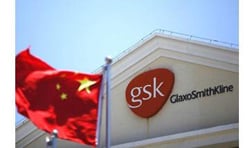 A GlaxoSmithKline ($GSK) plant in Tianjinin, China, that was rocked by an explosion in August has now been rocked by a European Medicines Agency (EMA) recommendation that its products be banned from Europe until it deals with decade-old problems with manufacturing there.
A GlaxoSmithKline ($GSK) plant in Tianjinin, China, that was rocked by an explosion in August has now been rocked by a European Medicines Agency (EMA) recommendation that its products be banned from Europe until it deals with decade-old problems with manufacturing there.
A report filed Monday by the European Medicines Agency (EMA) said that during an inspection in June, U.K. regulators found what they determined was a "critical deficiency" tied to a systems failure that put into question whether its drugs "were fit for their intended use." They said dating back to 2005, GSK has had tablet discoloration in stability samples of over-the-counter heartburn med Zantac that did not meet specs for shelf life. The problems indicated "non-sterile" manufacturing and packaging, the report says.
Inspectors said GSK never investigated to figure out the cause, didn't notify authorities of the issues and didn't take steps that would make sure defective products were not sent to customers. The plant was tagged with a certificate of noncompliance, and inspectors recommended it not be allowed to market any new drugs until it gets its issues resolved.
In an emailed response Tuesday, GSK said, "We can confirm the UK MHRA has made the decision to withdraw previously issued GMP certificates for our GSK's site in Tianjin, China. This affects Zantac which is the only product supplied to Europe from the Tianjin site.
"We take this issue very seriously and make every effort to ensure our global supply network fully complies with all applicable regulatory expectations.
The company confirmed the plant is not operating now anyway. It has been closed since a series of explosions and a massive fire at a chemical storage warehouse in the Tianjin industrial district in August killed 160 and did widespread damage. No one at the GSK plant was injured by the nearby blast but the facility was damaged, leaving GSK to figure out how to supply customers with the products that were manufactured there.
That was the drugmaker's second production interruption in August. Its Zebulon, NC, plant also stopped production after routine testing of its cooling towers detected the bacteria for Legionnaires' disease. The plant was closed for about a week while GSK had the cooling towers disinfected and retested.
- access the report here